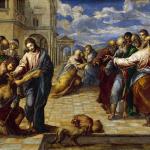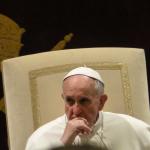 In trying to console his friend, the decaconess St Olympia, St John Chrysostom reminded her of a truth understood by the ancient world, that in a sense, life is but a dream, a fable. When we wake up from sleep, we do not care about the glories and honors, or the pains and sorrows, we suffered in our dreams. Likewise, we shall have little to no care about those things once we reach the eschaton:
In trying to console his friend, the decaconess St Olympia, St John Chrysostom reminded her of a truth understood by the ancient world, that in a sense, life is but a dream, a fable. When we wake up from sleep, we do not care about the glories and honors, or the pains and sorrows, we suffered in our dreams. Likewise, we shall have little to no care about those things once we reach the eschaton:
Therefore, do not be cast down, I beseech you. For there is only one thing, Olympia, to fear, only one real temptation, and that is sin. This is the refrain that I keep chanting to you ceaselessly. For everything else is ultimately a fable – whether you speak of plots, or enmities, or deceptions, or slanders, or abuses, or accusations, or confiscations, or banishments, or sharpened swords, or high seas, or war engulfing the whole world. Whichever of these you point to, they are transitory and perishable, and they only affect mortal bodies ; they cannot in any way injure the watchful soul. [1]
This advice, of course, can be easily abused and used to support all kinds of evils. If we think life is merely a dream which has no meaning for us in the afterlife then we can easily be led to accept all kinds of abuse without doing anything to stop such abuses. This was not the intent of St. John Chrysostom. Indeed, as his life and struggles indicated, he found himself in exile because he promoted justice, thinking it important to stand for what was right. He knew that what we do in life has meaning for us and our personal development. Likewise, it would be better if we did not suffer from evil, even as we would prefer never to experience nightmares. The point of his words wass to remind us that those who look for and become overly attached to transient glory will find that glory will vanish, and that as it vanishes, its ephemeral nature will become known.
St John Chrysostom understood that much of what we do in our life, much of the focus of our lives, and the attachments which we make, are all for naught. What matters is how we care for others, how we treat others with love and respect. This is what counts. Everything we do should be focused upon love, for what is borne out of love will thrive and persist. Pain and suffering matters, but they will not last forever. We should not seek them out or wish them upon others, but if we suffer them, we must keep in mind, it will not last. Just as those who experience joy and pleasure in their domineering control of others will find their joys will not last. The world around us is in flux. Nothing lasts forever. Nothing remains. All things which come into existence will perish. To try to hold onto things as they are, to presume to identify reality as what we perceive things to be like in the present, and hold onto it and fixate ourselves upon it, is to hold onto an illusion.
Currently, we do not comprehend the whole of reality. We do not realize how all things are working together and are united in one integral reality. We overlay reality with a dream-like fantasy; like all dreams, we will one day realize things are not as we identified them to be. Eventually, we will wake up and see through the fantasy which we lived. The life which we try to establish, the life which we try to create for ourselves, the life which we construct out of our perceptions and intellectual notions is but a dream – perhaps a noble dream, but a dream nonetheless, and it is pure vanity to try to hold on to it and freeze the world in the construct which we have made for it. “Vanity of vanities, says the Preacher, vanity of vanities! All is vanity. What does man gain by all the toil at which he toils under the sun?” (Eccl. 1:2-3 RSV).
Our minds take in various perceptions from our senses and interprets them in such a way that it can be said to create for us the dream-like world in which we live. This is not to say there is no objective world in which we live, that there is no objective reality outside of us: there is, but we do not perceive it or realize it as it is. Our senses cannot receive reality as it is: they filter it for us, and then our minds take what we have received from our senses, and further filters our perceptions with the interpretive scheme which we have created for ourselves (both consciously and unconsciously). What we understand of the world is reflected upon the world itself. We do not directly experience the world at large. We experience it through the hermeneutic lens which our mind created for us, and indeed, in a way, we experience the world solely in and through our minds. The objective truth of the world is experienced subjectively, and we cannot tell if the way we experience it is shared by others. If we trust our senses, that our mind did not create external phenomena, we know that others exist beyond us, and we share a world in common with them. We can, likewise, engage them and communicate our experiences of the world with them even as we listen to them and their experiences. While we share subjects and categories in common, we really do not know if we understand them the same way as others do, and so what we experience, though somehow communicated to others, remains an experience which is ours alone, and an experience which is manifested to us in and through our mind and how it interprets and engages the data which it receives. We all exist, therefore, in our own dream world, but it is a dream world which somehow has contact with and association with others who exist outside of it (similar to the way we can experience sounds happening around us influencing our dreams).
To be sure, there is an interdependent relationship between the world at large and our experience of it in our mind. When we change our mind, our experience of the world changes. When our experience of the world changes, our mind is going to change. It is going to reflect and see things differently, and our experience will change. All things change, including, and especially our experience of the world. It is ever in flux.
Life, then, is a dream, but it is a dream with substance. It is a dream related to reality, but it is not the same as reality itself. Our mind tries to create an objective experience of the world, but It remains, nonetheless, subjective, and what our mind establishes for the world in ourselves is not the same as the world as it is in itself, as it is in reality. The world is in flux, the things of the world do not exist in themselves as they exist in our mind. The more we try to establish the things as they exist in our mind upon the world, the more the relationship will lead to a struggle which will cause suffering, both for us, but also for those subjects and objects outside of us as we try to impose our dream upon them, forcing them not only to conform to the ideas which we have for them, but to be frozen, to be as we want them to be, never changing, never being true to themselves and what they are in themselves in a world of flux. We find pleasure in being god-like beings over others, making them conform to our ideas, while we find pain and suffering in being forced to conform to the notions of others as well as the influx of reality overcoming and dismantling the mental construct which we have created for ourselves of the world at large.
We should, therefore, overcome our fallen mode of being, the self-theosis of Adam, seeking to control and dominate creation. To do this, we must die to the self, and overcome our mind as it seeks to construct a dream world instead of the truth which exists beyond it. Once we do so, we will be free. We will be able to attain true beatitude. For we will then welcome and accept the grace given to us by God. We will, indeed, find ourselves united with God. So long as we put up a mental barrier between us and the world, God will be covered up by that dream; when we die to the self, and let go of our mind, letting go of our dream and all attempts to dominate the world through it, we can then awaken to reality without filter, and perceive God everywhere and see the glory and beauty of reality itself. We will be like Abu al-Hasan al-Shushtari, who said:
My beloved encompasses all existence.
He is visible in white and black,
and in Christian and Jew,and in the letters and their points,
just understand me, just. [2]
Abraham Isaac Kook, likewise, told us about this splendor, the beauty of God and his creation which is all around us. We must enter the gate – the gateless gate where the mind and its egotistical attempt to control creation has been overcome—so that we can then see the merger of heaven and earth, to see reality as it is, to see and experience creation in its glory (instead of the shame which came upon it due to our mind games). We must enter this gateless gate, so that in all things, the divine presence and glory is known, this gateless gate which allows us to awaken from the slumber and nightmare of our lives:
It is necessary to show how one may enter the palace: by the way of the gate. The gate is the divine dimension disclosed in the world, in all its phenomena of beauty and grandeur, as manifested in every living thing, in every insect, in every blooming plant and flower, in every nation and state, in the sea with its turbulent waves, in the panorama of the skies, in the talents of all creatures, in the thoughts of writers, the imagination of poets and the ideas of thinkers, in the feelings of every sensitive spirit and in the heroic deeds of every person of valor. [3]
To say life is a dream is not to say the world and all that is in it is mere illusion, it is only to say that our experience of it is defiled, indeed, it has turned into a nightmare. This was not God’s intention for us. It is all vanity and all of it is going to vanish as smoke vanishes in the wind. Then, when we wake up, when we perceive the world without defilement, we will see all things and know all things in God and through God, instead of our defiled mind. Then, finally. we will see what the mystics tell us to see: we will understand for there will be nothing holding us back.
[IMG=Scene from the play Calderon’s Life is a Dream by Uark Theater [CC2.0] via Flickr]
[1] St John Chrysostom, “Letter Seven to Olympia” in Letters To Olympia. Trans. David C. Ford (Yonkers, NY: St Vladimir’s Seminary Press, 2016),46.
[2] Abu al-Hasan al-Shushtari, “Just Understand Me” in Songs of Love and Devotion. trans. Lourdes Maria Alvarez (New York: Paulist Press, 1999), 85.
[3] Abraham Isaac Kook, “A Thirst for the Living God” in Abraham Isaac Kook: The Lights of Penitence, The Moral Principles, Lights of Holiness, Essays, Letters, and Poems. Trans. Ben Zion Bokser (New York: Paulist Press, 1978), 251.
Stay in touch! Like A Little Bit of Nothing on Facebook.
If you have liked what you read, please consider sharing it with your friends and family!













